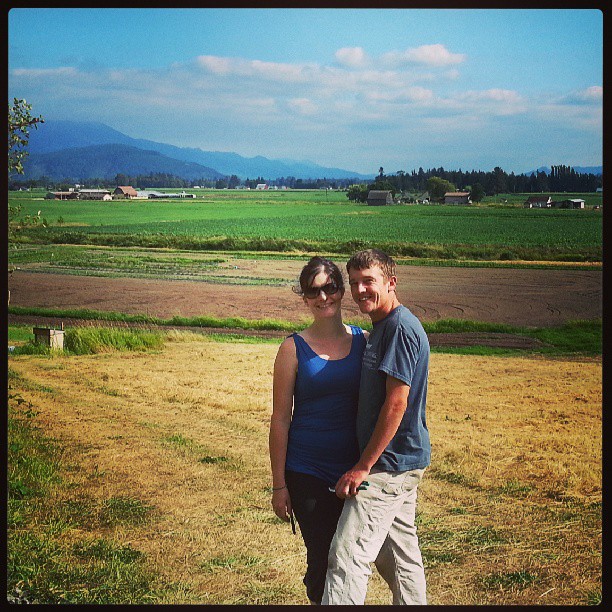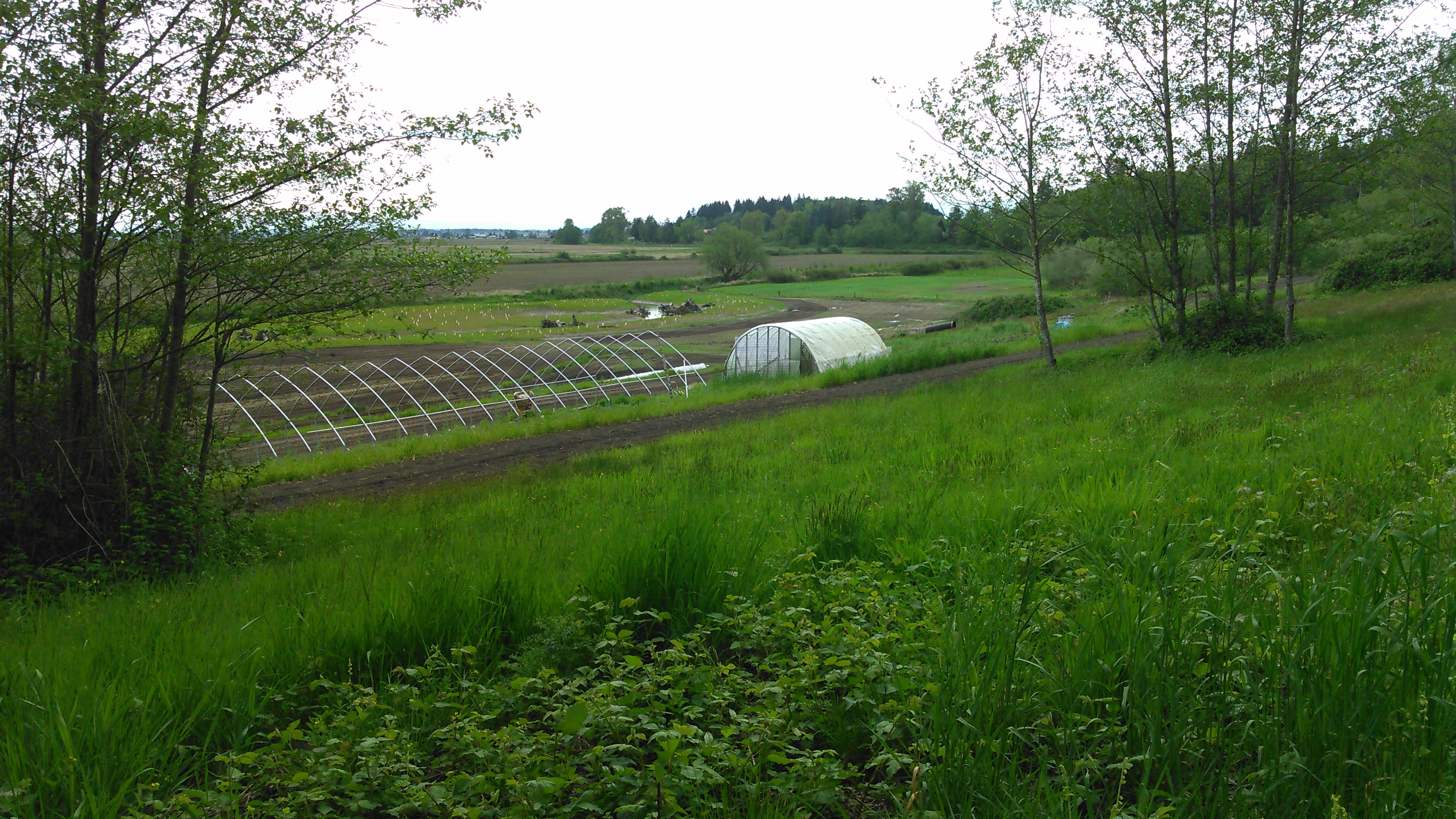Producer


Southern Exposure Family Farm
Contact: Jimmy and Kara Kintzele
Address: 7662 F & S Grade Road Sedro Woolley, WA, 98284
County: Skagit
Phone: 360-320-2856
About Us
A healthy community depends on healthy food, and healthy food depends on a diverse and cooperative farming community! Southern Exposure Family Farm is just one of many doing our part for the greater good! In 2020 we installed a 25kW solar array, and can proudly state our farm is 100% solar powered!
The 11 acres of land we are honored to cultivate is nestled in the beautiful Skagit Valley, halfway between Seattle and Vancouver, British Columbia. We harvest our bounty for caterers, co-ops, daycare centers, hospitals, markets, peppersauce makers, restaurants, and retirement homes between Bellingham to Seattle and the San Juan Islands, and sell limited nursery starts of the plants we love to grow to friends, fellow farmers, neighbors, and co-ops.
Our family farm lie fallow since the 1990's, and since we purchased it in 2011, we have been breaking the land and methodically improving it using sustainable farming practices, striving to conserve our resources and grow happy and productive plants. While many of our offerings are available in bulk, some are limited due to the young nature of our farm and ongoing varietal testing.
In 2014, we installed a 1.7 acre juvenile salmon habitat restoration project on our farm along Thomas Creek, a tributary of the Samish River, which feeds into the waters that create world-renowned oysters in Samish Bay from Taylor Shellfish and Blau Oysters - YUMMO! This juvenile salmon habitat restoration project's success was due to the cooperation and teamwork of a great many hands from Skagit County, Washington State's WDFW and Dept of Ecology, the USDA NRCS, the Samish and the Swinomish Native American Tribes, the Skagit Fisheries Enhancement Group, and hundreds of friends, family, and community members that helped make this project a reality.
We have been performing extensive varietal tests to find which fruits and veggies grows best in our micro-climate, and offer items in bulk that we know grow well on our farm. We are also offering limited varieties of other vegetables which we are testing to ensure we can deliver a reliable supply in years to come. Each year we take extensive notes on plant performance, seasonal growing conditions, and customer feedback, to ensure we learn from each season and improve our offerings every year.
We host community educational tours several times a year on our farm for a wide variety of groups, discussing the many conservation measures we use, the salmon restoration project, our ever-changing varietal testing, beneficial plants and cover crops, and the energy efficient systems throughout the farm. We look forward to participating and being involved in more community outreach, both to share our knowledge and learn from each other. We are all on this planet together as one, and must do our part to ensure our best practices help future generations.
Half of our farm is fertile Skagit Valley lowland fields in the 100 year floodplain, ideal for growing crops that prefer this cooler microclimate and nightly dew waterings like carrots, peas, and corn, but never a tomato! The other half of the farm is a southern exposed hillside with multiple terraces and greenhouses that naturally retain warmth and allow us a dependable month or two of season extension beyond our lowland fields. We also challenge ourselves to grow crops that normally want more heat like lemongrass, seasoning peppers, and searing hot peppers :).
In the past several years, we scaled back farm operations to dedicate more time to family and to expand the quality and bounty to ensure productive seasons well into the future.
We thank you for your support and time spent reading about our farm, and we look forward to meeting you at one of our local co-ops, a community event, or throughout the region as we plant seeds in our common ground for the greater good!
The 11 acres of land we are honored to cultivate is nestled in the beautiful Skagit Valley, halfway between Seattle and Vancouver, British Columbia. We harvest our bounty for caterers, co-ops, daycare centers, hospitals, markets, peppersauce makers, restaurants, and retirement homes between Bellingham to Seattle and the San Juan Islands, and sell limited nursery starts of the plants we love to grow to friends, fellow farmers, neighbors, and co-ops.
Our family farm lie fallow since the 1990's, and since we purchased it in 2011, we have been breaking the land and methodically improving it using sustainable farming practices, striving to conserve our resources and grow happy and productive plants. While many of our offerings are available in bulk, some are limited due to the young nature of our farm and ongoing varietal testing.
In 2014, we installed a 1.7 acre juvenile salmon habitat restoration project on our farm along Thomas Creek, a tributary of the Samish River, which feeds into the waters that create world-renowned oysters in Samish Bay from Taylor Shellfish and Blau Oysters - YUMMO! This juvenile salmon habitat restoration project's success was due to the cooperation and teamwork of a great many hands from Skagit County, Washington State's WDFW and Dept of Ecology, the USDA NRCS, the Samish and the Swinomish Native American Tribes, the Skagit Fisheries Enhancement Group, and hundreds of friends, family, and community members that helped make this project a reality.
We have been performing extensive varietal tests to find which fruits and veggies grows best in our micro-climate, and offer items in bulk that we know grow well on our farm. We are also offering limited varieties of other vegetables which we are testing to ensure we can deliver a reliable supply in years to come. Each year we take extensive notes on plant performance, seasonal growing conditions, and customer feedback, to ensure we learn from each season and improve our offerings every year.
We host community educational tours several times a year on our farm for a wide variety of groups, discussing the many conservation measures we use, the salmon restoration project, our ever-changing varietal testing, beneficial plants and cover crops, and the energy efficient systems throughout the farm. We look forward to participating and being involved in more community outreach, both to share our knowledge and learn from each other. We are all on this planet together as one, and must do our part to ensure our best practices help future generations.
Half of our farm is fertile Skagit Valley lowland fields in the 100 year floodplain, ideal for growing crops that prefer this cooler microclimate and nightly dew waterings like carrots, peas, and corn, but never a tomato! The other half of the farm is a southern exposed hillside with multiple terraces and greenhouses that naturally retain warmth and allow us a dependable month or two of season extension beyond our lowland fields. We also challenge ourselves to grow crops that normally want more heat like lemongrass, seasoning peppers, and searing hot peppers :).
In the past several years, we scaled back farm operations to dedicate more time to family and to expand the quality and bounty to ensure productive seasons well into the future.
We thank you for your support and time spent reading about our farm, and we look forward to meeting you at one of our local co-ops, a community event, or throughout the region as we plant seeds in our common ground for the greater good!
Practices
Crop rotation, cover crops, and a low-till mindset minimize erosion and improves the soil tilth, encouraging healthy ecosystems so our fruits and vegetables can thrive.
We use some gravity fed irrigation systems and schedule our watering to save energy and minimize water evaporation.
For season extensions and warm loving plants, we used the excavated nutrient-rich soils from our salmon restoration project to build numerous terraces onto our heat-capturing southern exposed hillsides. We have several greenhouses for lemongrass, peppers, tomatoes, and other warm loving goodies we grow. We also use floating row covers to protect seedlings from harsh spring weather and naturally decrease pesky bug problems, plus we strategically plant beneficial flowers like Lacy Phacelia and Crimson Clover to attract beneficial predators like wasps and ladybugs, and with a bonus of happy bees for our neighbor's many hives!
We use some gravity fed irrigation systems and schedule our watering to save energy and minimize water evaporation.
For season extensions and warm loving plants, we used the excavated nutrient-rich soils from our salmon restoration project to build numerous terraces onto our heat-capturing southern exposed hillsides. We have several greenhouses for lemongrass, peppers, tomatoes, and other warm loving goodies we grow. We also use floating row covers to protect seedlings from harsh spring weather and naturally decrease pesky bug problems, plus we strategically plant beneficial flowers like Lacy Phacelia and Crimson Clover to attract beneficial predators like wasps and ladybugs, and with a bonus of happy bees for our neighbor's many hives!
